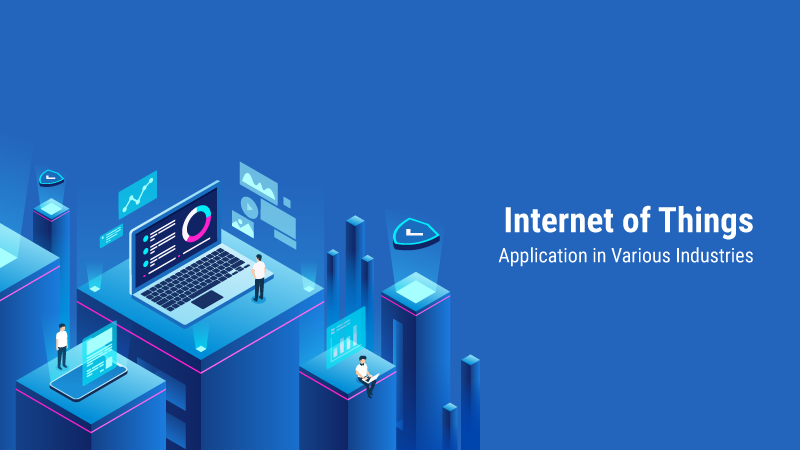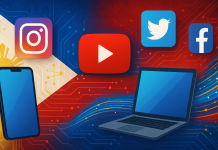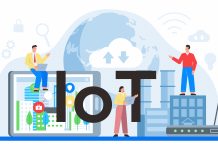Introduction
The internet, being one of the most advanced technological innovations, offers endless possibilities in the current world. The Internet of Things, otherwise known as IoT technology is a network of devices that are connected to each other with sensors that gather, store, share, and process in order to meet the needs of today’s people. Moreover, it unlocks the door to endless opportunities. While the Internet of Things (IoT) is not a new concept, it has led to a number of IT trends in enterprises in recent years. Nowadays, this technology is implemented in different industries or sectors by many businesses to simplify, generate, automate and track various processes. Many of us still consider IoT as a broad concept.
Here in this article, we are going to discuss some of the possible IoT applications in various industries that are providing different services to each of us.
Application of IoT across various industries
The application of IoT technology is enormous as it can be implemented in any system that can give corresponding information about the service, results of operation, and the factors required to remotely track and control it. Let us move into the application of IoT in various industries.
- IoT in the healthcare industry – The potential of IoT in Manufacturing Market is endless in the healthcare sector and IoT-enabled medical instruments dominating the industry is a clear example of this. Though these instruments have security risks associated with them, those issues are overruled by the benefits they offer. IoT is an important factor behind the growth of telemedicine (or telehealth), which facilitates medical professionals to interact and monitor long-distance patients. Apart from that, hospitals utilize this technology to monitor patients and staff and use technology to minimize waiting time in the emergency room. The healthcare industry can be further innovated using IoT technology, and new methods of treatment with the least errors. IoT-supported system also allows for faster access to data collected from patients, thus reducing costs by reducing unnecessary visits to physicians.
- IoT in education – IoT promises educational assistance to help bridge the gaps in the education sector. This not only enhances the quality of education but also decreases the expense and improves leadership in terms of student responsiveness and success. Schools use IoT to promote a more web-based interactive learning experience so that students can explore more than what is in the textbook. Teachers use this technology to store important documents such as grades and attendance of the students, which eliminates the time to retrieve that data. Most significantly, it also maintains extra security in the school by using IoT-enabled communication systems that alert students about any possible risks or emergencies.
- IoT in the retail industry – The Internet of Things has a huge influence on the retail industry. Using IoT services, companies can conduct more virtual interactions with their potential customers, thereby improving the customer experience of the services and products offered. To make this a success, the main element for making it a reality is smartphones. It is easy to execute IoT technology since smartphones are used by almost everyone and data collection will be more efficient so that retailers can customize their products and services according to the needs of the customer. Technology also improves security by reducing the risk of theft.
- IoT in the manufacturing industry – The manufacturing industry is one of the best examples of all the industries that use IoT applications. Currently, manufacturers are implementing IoT services to track the flow of products throughout the whole process. This solution enables manufacturers to monitor every event across a distribution network. The data collected from IoT devices allows manufacturers to measure the quality of each item and trace inventory to individual components. This technology will also help improve the packaging and safety of workers.
- IoT in agriculture – The demand for food increases as the population grows, which is why food shortages are increasing in some countries, leaving people frustrated and starving. IoT can assist the agriculture industry using the data collected to generate meaningful statistics to get the best return on investment. IoT farming applications can be used by farmers to optimize many different activities, like determining the accurate time to harvest crops, making fertilizer profiles based on soil chemistry, and detecting soil nutrient and moisture concentrations. Luckily, the government is providing the necessary help to farmers to produce more food and earn an equal income from their produce.
- IoT in smart houses – Many of the households are using television that can be connected to the internet. Other than televisions there are houses that are supported by IoT services that can remotely turn the lights off and on when people enter and leave. All these technologies are part of the Internet of Things. Smart Homes enables you to manage all of your home appliances from a single place. With IoT service being implemented, a surveillance camera can also be used to avoid burglary and robbery.
Wrap Up
IoT is the next great leap in the age of information. Internet of Things can make changes in our daily lives, daily tasks, and everyday communities. IoT takes everything under a single umbrella. With smartphones being the main portal, everything will be brought to your fingertip with the technology. IoT has evolved to an unavoidable part of our life and is no more a simple concept. Above mentioned use cases are just a few among many IoT applications implemented across these industries. Over time, there will be an increase in the number of use cases of IoT services.
Author Bio
 Mubarak MusthafaVice President of Technology & Services at ClaySys Technologies.
Mubarak MusthafaVice President of Technology & Services at ClaySys Technologies.






